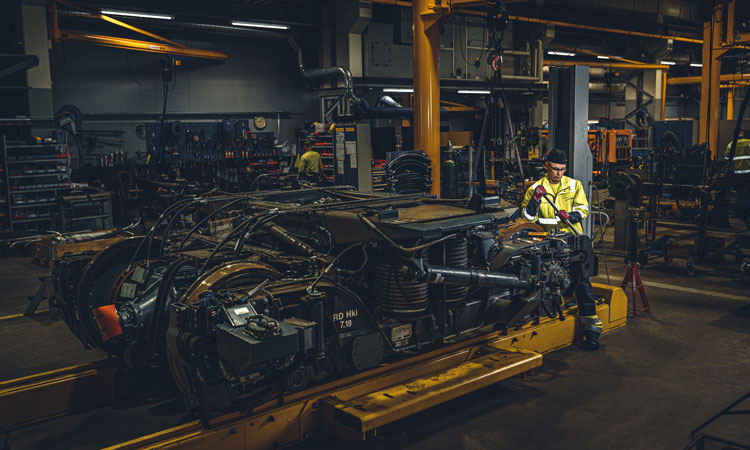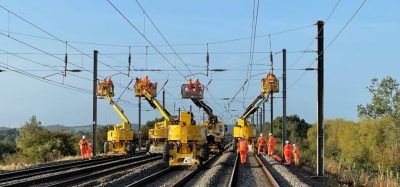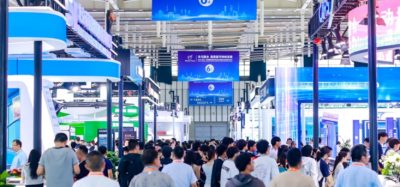The digital revolution reaches rolling stock component services
Posted: 11 August 2021 | Anders Karlsson, Sami Kalevirta | No comments yet
Major global trends of digitalisation and sustainability increasingly guide the development cycle of component services in rail transport. VR FleetCare’s Vice President of Component Services, Anders Karlsson, and Head of Digital Services, Sami Kalevirta, explain how these trends impact the way that VR FleetCare undertakes the maintenance of rolling stock components.


The traditional railway industry has changed strongly during the past 20 years, from a field with national operators towards an international playing field. The change in the competitive situation has forced the players to seek new innovations – the traditional model is no longer good enough for customers.
Digitalisation is one of the biggest trends in rail transport maintenance. In other industries, servicing and maintenance processes have been built on a digital base for a long time already. The development of cloud services and computing power, the decrease in costs of sensor technology and examples from other industries have finally brought digital services to rolling stock maintenance, as well.
Another global trend that has effects on rail transport is sustainability. As a Finnish rolling stock maintenance company, it has always been necessary for us to carefully consider recycling components. In the early days of VR FleetCare’s history of more than 150 years, operations were guided by the scarcity of resources. Today, sustainability is increasingly steering our activities. Behind all of this, there are also some Finnish values, too. For example, bridges are repaired and serviced for 100 years in Finland, while a new bridge is built every 25 years in some other countries. Everyone can think about which approach is the more profitable and environmentally sustainable solution.
For decades, we have been looking for different solutions to prolong the lifecycle of components. In practice, we refurbish components that need to be repaired and reinstall them instead of replacing the components with new ones. Having refurbished spare parts available at the right time ensures the good reliability and availability of rolling stock.
A circular economy of components is a reasonable and cost-effective option because, in the best case, the need for a major rolling stock investment can be postponed for decades through component maintenance and repairs. In addition, the prices of individual large components are high in the rail industry, and their availability is not a given in the case of rolling stock used for 35‑40 years, either.
Value is created through expertise
The VR FleetCare Component Service performs the maintenance work and refurbishment of electric, power electronics and mechanical components. At the moment, VR FleetCare’s business unit of approximately 200 professionals refurbishes more than 2,000 individual component items each year. We are responsible for the maintenance of all rolling stock and locomotive wheelsets of passenger and freight traffic in Finland, for example.
Throughout the 2010s, our production activities followed the Lean method, known as the principle of continuous improvement. In this way, we have standardised the quality and efficiency of our production. VR FleetCare’s expertise is based on the company’s long operational history in Nordic conditions.
From the point of view of the development of component services, the most essential question is not only ‘how’ it is done, but ‘what’ is done. Our experts know precisely how components behave under different conditions or how they react to prolonged maintenance intervals, for example. Adding digital services and data to the actual condition of components collected through sensors informs us what should be done and when. This means that we can make controlled changes in maintenance programmes and influence lifecycle costs and the reliability of rolling stock.
When production is efficient, its location does not matter much in competitive bidding. VR FleetCare is already maintaining the bogies of the FLIRT rolling stock of the Estonian railway operator Elron, for instance. We can provide spare part refurbishment for all rolling stock, even in small batches, if necessary.
We are currently expanding our component service production, having functionality and efficiency as starting points of our operations. We see significant growth potential in component maintenance and repair services in the near future.
From reaction towards foresight
Smart and data-controlled maintenance will revolutionise future component maintenance. From the customer’s point of view, it has undisputed benefits: Lower lifecycle costs of rolling stock, improved reliability of components and foresight of maintenance needs.
Imagine a scenario: A bearing in the motor of a locomotive breaks down and causes a motor failure. The rolling stock disrupts traffic and customers suffer from additional wait times. Repairing the motor has a price tag of €80,000 to €100,000. On top of all of that, the rolling stock has to wait for a suitable part at the depot for an additional week, and social media is full of posts on the delayed train services. All of this was caused by a single bearing failing, and its failure could have, at best, been foreseen months in advance.
In 2019, we took a major leap in rolling stock maintenance when we and EKE-Electronics Ltd introduced a service that predicts the maintenance needs of bogies. The technical solution was innovative, even on a global scale.
The service involves the installation of measurement equipment that is installed on the bogie body. It utilises technology based on sensitive vibration sensors to monitor the function of the bogie’s most critical components. The collected data is transferred to a cloud database, where it is transformed into an easy-to-read visual format. Edge computing analyses the raw data of the most critical components already on the way, sending an alarm, if necessary. Maintenance can review real-time data on bogie condition using a browser‑based user interface and make long time previsions for maintenance planning.
The importance of skilled partners cannot be emphasised too much when launching new digital services. VR FleetCare has been able to benefit from the best in the field, because the mobile phone brand Nokia has left significant digital expertise relating to sensor technology, for instance, in Finland.
Possibilities of data-controlled maintenance
In recent years, VR FleetCare has been piloting condition monitoring of the rolling stock and railway infrastructure. For example, we have been carrying out monitoring of the wheelsets of double‑deck cars in passenger services and monitoring of bogies of electric locomotives, while also providing interesting results for track maintenance. The most significant lesson learned from all of the pilot projects has been that digital condition monitoring is possible and profitable in rail transport.
Next, we will launch a monitoring pilot project involving 30 passenger cars in Finland together with SKF, installing sensors in 120 wheelsets to monitor their function. The aim of the three-year pilot project is to double the maintenance interval of the wheelsets.
Data-controlled maintenance will be one of the biggest factors sharpening the competitive edge in the future. Digital additional services, such as bogie sensors, will be basic parts of new and refurbished rolling stock in the next couple of years.
We can already monitor the function of an individual component and view its location, mileage and maintenance history, for instance. Currently, monitoring has been focused on the most critical components to bogie function. However, as the technology develops, we will certainly be seeing increasing individual monitoring of other critical components, as well.
With all of the hype, we should also remember that smart service involves a lot more than digitalisation. We can collect data and get very detailed information about the condition of rolling stock, but the actual value of a service is generated through expertise. Going forward, prospering service providers in the industry will need to know how maintenance programmes, for instance, can be developed on the basis of data, thereby creating value for customers.
Even though digital services aim to increase operational efficiency, safety is the number one priority in rail transport. Safety guides everything that we do, including the digital revolution.




Issue
Related topics
Bogies & Wheelsets, Digitalisation, Rolling Stock Components (Interior/Exterior), Rolling Stock Maintenance, Sustainability/Decarbonisation, Technology & Software








